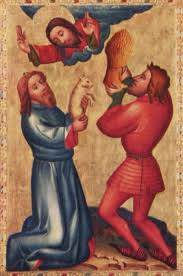 Why did God accept Abel’s sacrifice and not Cain’s? The answer comes by way of pastoralism.
Why did God accept Abel’s sacrifice and not Cain’s? The answer comes by way of pastoralism.
Now Abel kept flocks, and Cain worked the soil. In the course of time Cain brought some of the fruits of the soil as an offering to the Lord. And Abel also brought an offering—fat portions from some of the firstborn of his flock. The Lord looked with favor on Abel and his offering, but on Cain and his offering he did not look with favor. (from Genesis 4, NIV)
One of few professions actually older than prostitution, shepherds domesticated goats and sheep in Mesopotamia as a primary form of subsistence as early the seventh millennium B.C. (Davis 1987). Timothy Laniak (2006) thoroughly traces historic pastoral traditions and leadership. Raising large flocks, he writes, required a massive administrative system and a great deal of energy, not to mention the commitment to seek out sources of water and food while courageously fending off predators. Though farming likewise required significant time and energy, one’s livelihood was not as likely to wander off. Shepherding thus became rather legendary and the social and economic significance of pastoralism in the Ancient Near East became apparent in second millennium texts, punctuated by stories of patriarchs like Abraham of Ur. Laniak explores the metaphor both in Old Testament Israel and in surrounding kingdoms and their deities, and discusses shepherding prototypes such as Moses and the “flock” of God in the wilderness, and David as both shepherd-king and a sheep himself (ex: 23rd Psalm). He ends with Christ as Shepherd-Lamb-Messiah in the New Testament. The whole book is well worth a read.
At any rate, this makes it easier to scroll back to Cain and Abel. Adam remains in the background, having likely explained how they came to find themselves outside the garden and in need of an offering to present before God. Here is how these two men approached it:
– Cain invested himself in something renewable and which reflected his own skill as a horticulturalist. Bringing an armload of vegetables was a suitable gesture. God in fact specifies other vegetarian offerings in Levitical law including grain and olive oil. The role of a farmer is ultimately to bring vegetables to the table, whether God’s or his own. This he had done.
– Abel brought fat portions from the best of his livestock, meaning lives had to be ended. But the role of a shepherd is ultimately to keep sheep alive, not kill them. Every day is devoted to feeding and caring for them and protecting them. It was only the weakest sheep that were eaten out of necessity so as not to waste the protein. Deliberately killing one, and killing the best one, and doing so to appease one’s God, was anathema. It also required (and demonstrated) great faith. But this he had done.
It reflected on Cain and Abel accordingly. Abel’s reaction simply reinforced what God already knew to be in his heart.
***
Sources:
Davis, S.J.M. (1987). The archaeology of animals. New Haven, CT: Yale University Press
Laniak, T. (2006). Shepherds after my own heart: pastoral traditions and leadership in the bible.